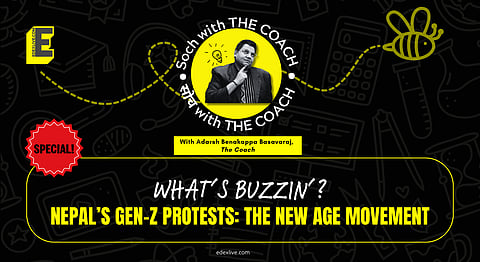

Picture this: You’re mid-scroll, laughing at a meme or reading an interesting column like mine , and suddenly — poof — the app’s gone! Imagine your frustration.
Now, imagine the same happening across an entire country! That’s exactly what happened in Nepal on 4 September 2025, when the government banned Facebook, YouTube, WhatsApp, X, and more. What officials hoped to be a routine regulation became the last straw or the final spark that ignited a ticking time bomb for a restless generation.
For Nepal’s Gen-Z, social media isn’t “timepass.” It’s community, economy, therapy, and identity rolled into one. Pulling the plug wasn’t just a tech decision. It was like slamming the door on their future. And they weren’t having it, especially when the whole country is not just suffering as a statistic, but rather from an epidemic of unemployment!
Beneath the hashtag: why Gen-Z erupted?
Let’s not oversimplify this, as it just cannot be. This wasn’t just about apps. The ban was the spark; the fuel had been piling up for years.
Corruption fatigue: Political dynasties flaunted privilege while ordinary youth scraped for visas and jobs.
Unemployment blues: With 1 in 5 young Nepalis jobless, frustration was already sky-high.
Nepotism rage: Hashtags like #NepoKids and #ByeNepoBabies mocked ministers’ children flaunting Gucci bags while taxpayers carried the burden.
Censorship fear: Cutting platforms felt like cutting voices — in a country where trust in institutions is already thin.
The week which changed Nepal
Day 1 (Sept 8): Thousands of students marched in Kathmandu chanting “Shut down corruption, not social media.” Police fired tear gas and bullets. 19 lives were lost.
Day 2: Crowds stormed parliament; flames lit the sky. PM KP Sharma Oli resigned. The Home Minister stepped down. The army imposed curfews.
Day 3-5: Under pressure, the ban was lifted. Negotiations moved online — even on Discord. Protest leaders demanded elections.
By Sept 12: Former Supreme Court judge Sushila Karki became interim PM. Fresh elections were set for March 2026.
Blink, and you’d miss history: from app ban → uprising → leadership collapse → new government in under a week.
What slogans said about the soul of the protest
“Shut down corruption, not social media.”
“No More Nepo Babies.”
“Youth against corruption.”
And the old anthem revived: “Gaun gaun bata utha, basti basti bata utha” (rise from every village, rise from every town).
It wasn’t just noise. It was identity: a generation that memes in English and chants in Nepali, blending both into protest poetry.
The effect? A mighty government toppled without any warning, the (digital) pen proved mightier than a sword.
Lessons for the youth
1. Energy is not strategy. Protests win attention; systems win change. Move from slogans to concrete demands: audits, quotas, jobs.
2. Violence steals credibility. Burning parliament trended, but it also scared allies. Discipline always outlasts fire. Violence isn't the ANSWER!
3. Stay in for the long game. Revolutions aren’t marathons or sprints — they’re relay races. Pass the baton, don’t burn out. Build a legacy, not an EVENT!
Lessons for leaders
1. Don’t trivialise “small” bans. In a digital-first world, platforms are identity and in many cases...livelihood!
2. Bullets don’t buy peace. Every injured student is a free recruitment for the opposition. You're not "controlling the situation," you're fuelling a "bigger chaos"
3. Show real accountability. Cosmetic reforms won’t cut it. Youth want visible laws, open audits, transparency, and proof of fairness.
Why this matters beyond Nepal
This wasn’t chaos for chaos’ sake. It was a generational reset. Gen-Z doesn’t lobby politely; they mobilise globally, meme locally, and pivot faster than governments can react.
For every leader in South Asia (and beyond), this was the warning trailer: ignore young people long enough, and they won’t just unfollow. They’ll overthrow.
My final Soch
Nepal’s youth didn’t rise because they lost Internet access or Wi-Fi. They rose because they were tired of losing time, dignity, and opportunity. The apps were the trigger. The fire was already there. This lesson just cannot be ignored, and hope governments all over become wary.
With regards,
Adarsh Benakappa Basavaraj
Your Coach reminding you: silence Gen-Z, and they’ll answer with surround sound.
